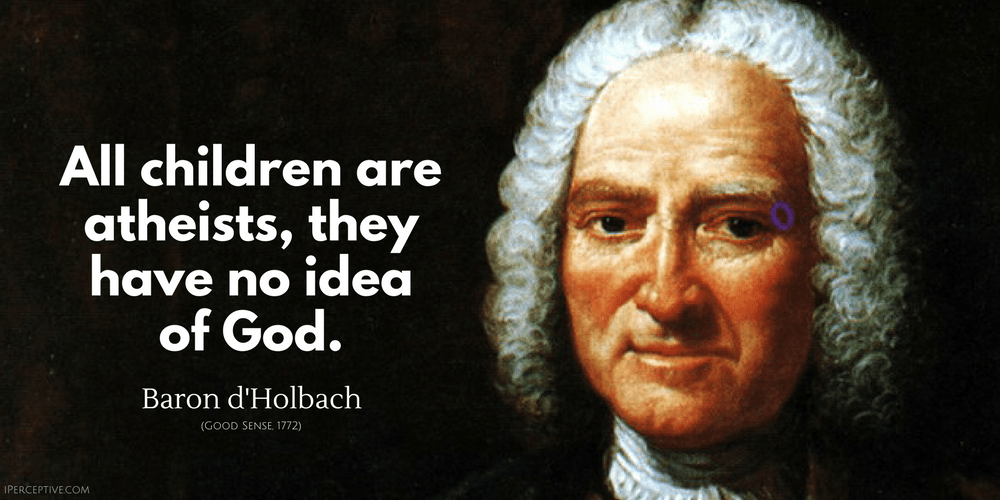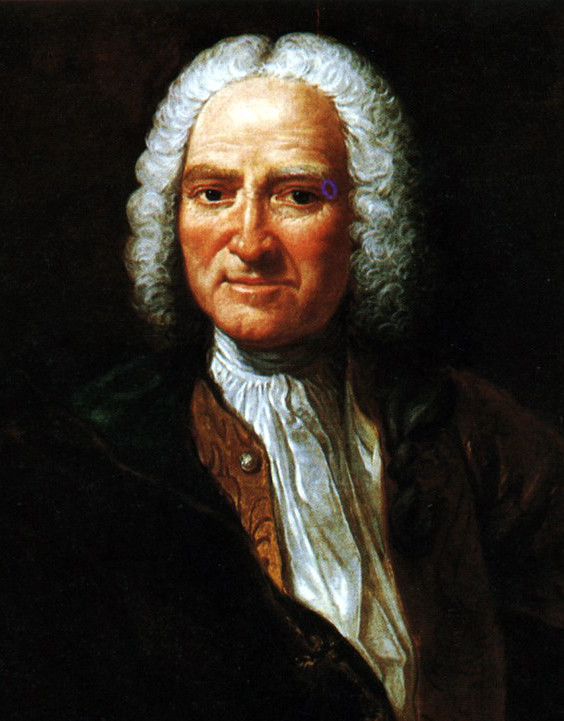Baron d'Holbach Quotes

All children are atheists - they have no idea of God.
Man, then, is not a free agent in any one instant of his life.
Tolerance and freedom of thought are the veritable antidotes to religious fanaticism.
Ignorance of natural causes created the gods, and priestly impostures made them terrible.
Is there any thing more contradictory, than an intelligent and omnipotent workman, who only produces to destroy?
The other world gives no motive for doing well to him who finds no motive for it here.
If the ignorance of nature gave birth to the gods, knowledge of nature is destined to destroy them.
It is thus superstition infatuates man from his infancy, fills him with vanity, and enslaves him with fanaticism.
All religions are ancient monuments to superstitions, ignorance, ferocity; and modern religions are only ancient follies rejuvenated.
The word God, will rarely be found to designate more than the unknown cause of those effects which man has either admired or dreaded.
What has been said of [God] is either unintelligible or perfectly contradictory; and for this reason must appear impossible to every man of common sense.
The atheist is a man who destroys the chimeras which afflict the human race, and so leads men back to nature, to experience and to reason.
All religious notions are uniformly founded on authority; all the religions the world forbid examination, and are not disposed that men should reason upon them.
The Christian religion is nearly extinct in England [and] the deists are innumerable; there are almost no atheists; those who are conceal it. An atheist and a scoundrel are almost synonymous terms for them.
It is the great complication of motion in man, it is the variety of his action, it is the multiplicity of causes that move him, whether simultaneaously or in continual succession, that persuades him that he is a free agent.
Savage and furious nations, perpetually at war, adore, under diverse names, some God, conformable to their ideas, that is to say, cruel, carnivorous, selfish, blood-thirsty.
When we examine the opinions of men, we find that nothing is more uncommon, than common sense; or, in other words, they lack judgment to discover plain truths, or to reject absurdities, and palpable contradictions.
The Christian burns the Jew at what is called an auto-da-fe because he clings to the faith of his fathers; the Roman Catholic condemns the Protestant to the flames, and makes a conscience of massacring him in cold blood.
Can theology give to the mind the ineffable boon of conceiving that which no man is in a capacity to comprehend? Can it procure to its agents the marvellous faculty of having precise ideas of a god composed of so many contradictory qualities?
In Nature nothing; is mean or contemptible, and it is only pride, originating in a false idea of our superiority, which causes our contempt for some of her productions. In the eyes of Nature, however, the oyster that vegetates at the bottom of the sea is as dear and perfect as the proud biped who devours it.
If we go back to the beginnings of things, we shall always find that ignorance and fear created the gods; that imagination, rapture and deception embellished them; that weakness worships them; that custom spares them; and that tyranny favors them in order to profit from the blindness of men.
Many men without morals have attacked religion because it was contrary to their inclinations. Many wise men have despised it because it seemed to them ridiculous. Many persons have regarded it with indifference, because they have never felt its true disadvantages. But it is as a citizen that I attack it, because it seems to me harmful to the happiness of the state, hostile to the march of the mind of man, and contrary to sound morality, from which the interests of state policy can never be separated.
Suns are extinguished or become corrupted, planets perish and scatter across the wastes of the sky; other suns are kindled, new planets formed to make their revolutions or describe new orbits, and man, an infinitely minute part of a globe which itself is only an imperceptible point in the immense whole, believes that the universe is made for himself.
Religion has ever filled the mind of man with darkness, and kept him in ignorance of his real duties and true interest. It is only by dispelling the clouds and phantoms of Religion, that we shall discover Truth, Reason, and Morality. Religion diverts us from the causes of evils, and from the remedies which nature prescribes; far from curing, it only aggravates, multiplies, and perpetuates them.
People have suffered and become insane for centuries by the thought of eternal punishment after death. Wouldn't it be better to depend on blind matter (...) than by a god who puts out traps for people, invites them to sin, and allows them to sin and commit crimes he could prevent. Only to finally get the barbarian pleasure to punish them in an excessive way, of no use for himself, without them changing their ways and without their example preventing others from committing crimes.
Man would not appear less subjected to the laws of Nature when naked in the forest painfully seeking his sustenance, than when living in civilised society surrounded with comforts; that is to say, enriched with greater experience, plunged in luxury, where he every day invents a thousand new wants and discovers a thousand new modes of satisfying them. All the steps taken by man to regulate his existence, ought only to be considered as a long succession of causes and effects, which are nothing more than the development of the first impulse given him by nature.
Let us not be told, that we thus attribute every thing to blind causes, and to a fortuitous concourse of atoms: we call those causes blind of which we are ignorant: we attribute effects to chance, when we do not perceive the tie which connects them with their causes. Nature is neither a blind cause, nor does she act by chance: all her productions are necessary, and always the effect of fixed laws.
If ye will have Gods, let your imagination give birth to them; but do not suffer these imaginary beings so far to intoxicate ye as to make ye mistake that which ye owe to those real beings with whom ye live. ...always remember that, among the duties you owe to the real beings with whom ye are associated, the foremost, the most consequential, the most immediate, stands a reasonable indulgence for the foibles of others.
The present state has served as the model of the future. We feel pleasure and pain - hence a heaven and a hell. A body is necessary for enjoying heavenly pleasures - hence the dogma of a resurrection.
But whence has the idea of hell arisen? Because, like a sick person who clings even to a miserable existence, man prefers a life of pain to annihilation, which he considers as the greatest of calamities. That notion was besides counterbalanced by the idea of divine mercy.
O Nature, sovereign of all beings, and your adorable daughters, virtue, reason, truth! be for ever our sole divinities; it is to you that the incense and homage of the earth are due. Show us, then, O Nature, what man must do to obtain the happiness which you have made him desire.... Inspire the intelligent being with courage; give him energy, that he can eventually love himself, esteem himself, feel his dignity; that he dares free himself, that he is happy and free, that he will never be a slave to your laws; that he perfects his fate; that he cherishes his fellow-beings; that he makes himself happy, that he makes others happy.

